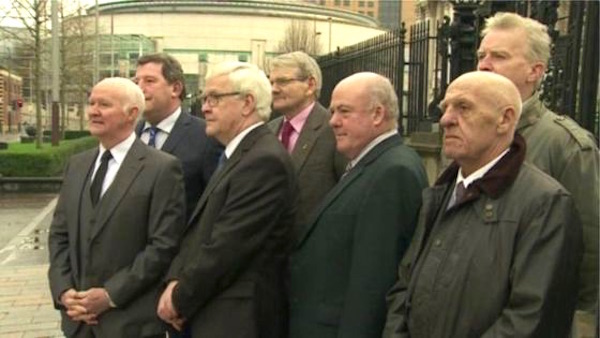
One of 14 Irish nationalists tortured during internment was bitten by a British soldier’s dog and forced to drink from the animal’s dish, the High Court heard this week.
School caretaker Sean McKenna was also slammed into concrete posts and dragged through streets barefoot after being taken from his Newry home in August 1971, it was revealed.
Lawyers for his daughter argued that the interrogation techniques “ruined” him and worsened a heart condition that led his death four years later at the age of 45.
Mary McKenna is taking legal action along with other surviving members of those who became known as the ‘Hooded Men’, in a bid to secure an independent and human rights-compliant investigation into their treatment.
Proceedings have been issued against the the PSNI police, British and Stormont authorities over their failure to properly investigate and order a full inquiry.
Five standard torture techniques were used against the men as part of what was called “deep interrogation”, but others faced other acts of brutality and violence with the aim of extracting information from them.
Government papers recently uncovered have shown that former British Prime Minister Edward Heath was involved in the decision-making process which directed the torture, while Stormont’s Prime Minister at the time, Brian Faulkner, was said to have been personally briefed on the deployment of the methods.
The court heard Ms McKenna was 14-years-old when her father and brother were both taken from their house by British soldiers. In a statement she recalled how when he returned home 10 days later he was “a very broken man”.
Reading from her affidavit, barrister Karen Quinlivan QC said: “He was sitting crying and was very shaky. I remember him telling me that he had been hooded and handcuffed to a British solider who had an Alsatian dog with him.
“He told me that the dog had been allowed to bite him and that he had been required to drink from the same dish as the dog.”
His internment ended in May 1972, when he was released on medical grounds to enter a psychiatric hospital. But the impact of being subjected to the torture caused his psychiatric break-down, according to his daughter, and he died of a heart attack just three years later.
The medical evidence backed allegations that his trauma was responsible for death as well as psychiatric injuries, the court was told.
It was further revealed that a government minister visited a training exercise for the “interrogation methods” in 1971. The court was told that the military taught the torture methods to RUC Special Branch officers who sought assurances of immunity from prosecution before carrying them out.
“The allegation in this case is that the decision to sanction that torture was taken by senior ministers,” said Hugh Southey QC.
“We would argue that the failure to prosecute government ministers has the potential to undermine the rule of law; it suggests impunity, it suggests ministers are above the law.”
In another statement heard by the court, one of the group recalled collapsing and being punched in the stomach to revive him. He was against the wall for three days, subjected to kicks or beatings every time he dropped to the ground or fell asleep.
“The applicant described suffering hallucinations and prayed for death,” Mr Southey said.
His treatment also resulted in serious psychiatric and psychological consequences, including treatment for post-traumatic stress disorder.
Based on the contents of memos and other documents, Mr Southey pointed out it was not in question that the men were subjected to treatment that violated their human rights, nor was it disputed either that authorisation came from senior government ministers.
A deliberate decision was made to prevent the full truth coming out with accusations of criminality against the state, he argued.
“There was throughout the 1970s a lack of candour essentially about precisely what ministers were aware of,” Mr Southey said.
He insisted that any ministerial involvement in what happened to the ‘Hooded Men’ should be subjected to criminal proceedings.
“If one doesn’t prosecute people at the highest level it gives rise to a greater sense of impunity,” he said.
He also referred to the definition of war crimes applied under the Rome Statute governing the International Criminal Court sitting at The Hague.
“It’s difficult to see how torture in the context one is talking about, people detained by the State in the circumstances they were, is any less serious than torture inflicted in a wartime situation,” the barrister said.
“Where one is looking at allegations of torture, which is an issue in this case, one is at the level of a war crime.”
![[Irish Republican News]](https://republican-news.org/graphics/title_gifs/rn.gif)
![[Irish Republican News]](https://republican-news.org/graphics/title_gifs/harp.gif)

